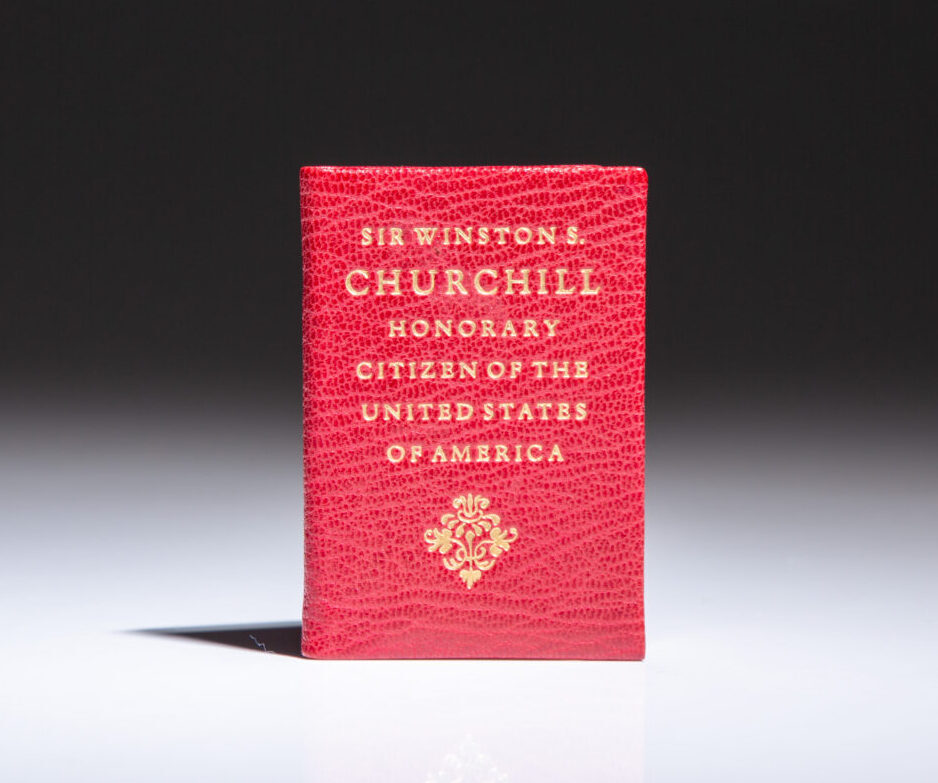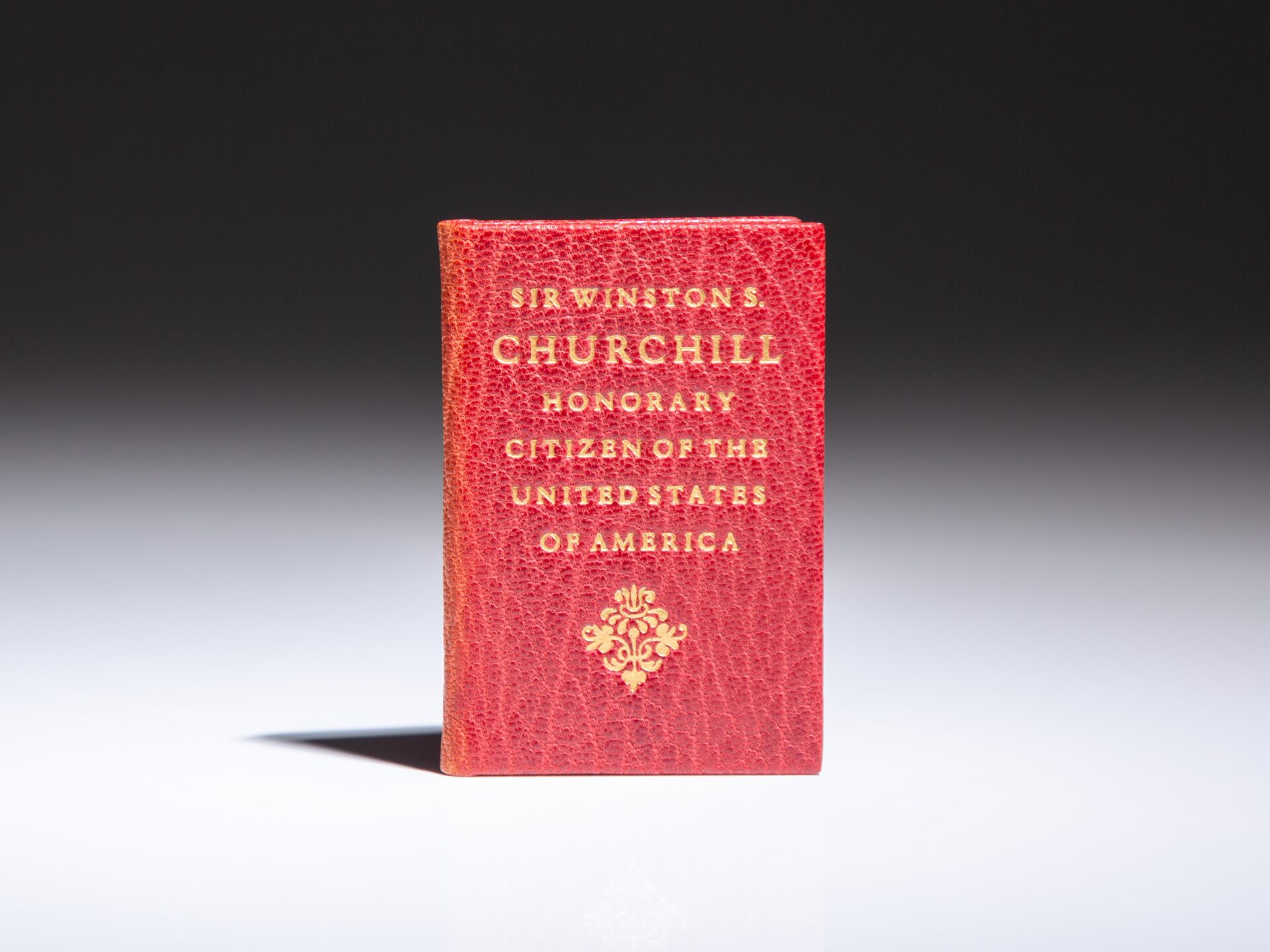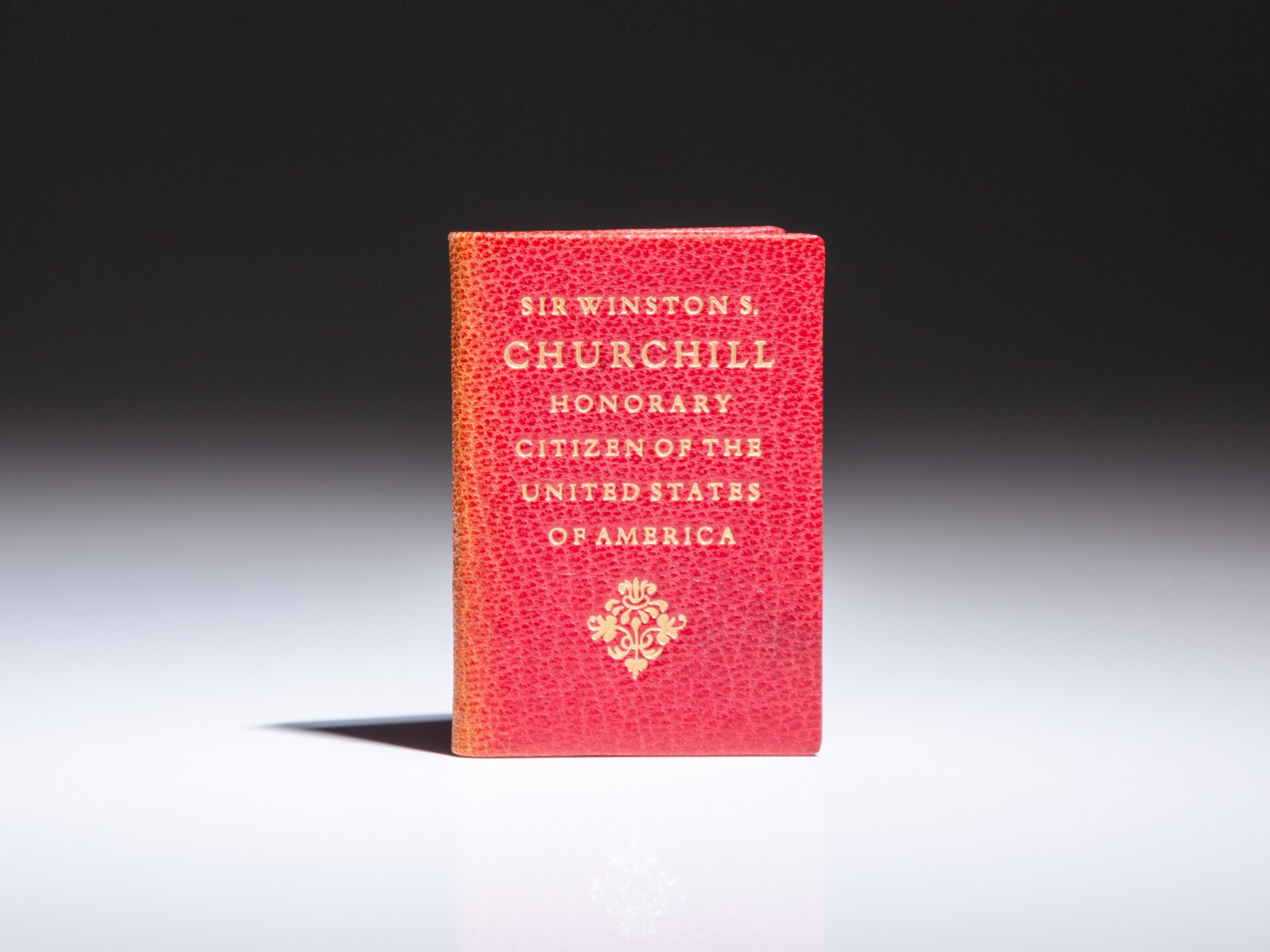
This is a single loose-leaf page from Mr. Citizen by President Harry Truman. It is the signed limitation page, not numbered, from a limited edition of 1000 copies.
Comments:

This is a single loose-leaf page from Mr. Citizen by President Harry Truman. It is the signed limitation page, not numbered, from a limited edition of 1000 copies.
Comments:

Limited edition of Mr. Citizen, signed by former President Harry S. Truman. Octavo, 315pp, gilt title, marbled end papers, maroon cloth covering. Original acetate protector. Lacking slipcase. Previous owners bookplate on front end paper. Limited edition of 1000 copies signed by President Truman, this being number 146.
Comments:

Signed first edition of I Led 3 Lives by Herbert A. Philbrick. Octavo, 398pp. Original black cloth. First edition with no additional printings on copyright page. In publishers dust jacket, $3.50 on front flap, some wear at edges, chipping along top edge of back panel, bright colors. Signed on the front endpaper in blue ink.
Comments: Herbert Philbrick infiltrated the U.S. communist party for the FBI in the 1940’s and wrote about his experiences in this book. The book inspired a television drama series in the 1950s, staring Richard Carlson.

First edition of The Man Who Knew Coolidge by Sinclair Lewis, in a restored first state dust jacket.
Octavo, [10], 11-275pp. Blue cloth, title stamped in orange. No additional printings on copyright page. Light dust along top edge of text block. Publisher’s dust jacket, with $2.00 price on front flap, light toning to white borders, professional restoration to spine edges and corners, bright illustrations. An attractive example.
A satirical novel by Sinclair Lewis, it is a follow-up to Elmer Gantry. The first section of the novel was originally published in The American Mercury in 1927.

Octavo, 288pp. Blue cloth, title in gilt on spine. First edition with no additional printings noted on copyright page. Blue end papers. In publishers dust jacket, $5.95 on front flap, light wear at edges, bright colors, shelf wear on front panel. Inscribed by Governor Romney: “To _, One of the things that made my candidacy effort worthwhile was getting to know you and your delightful children. Lenore and I will always cherish memories of our efforts! George Romney.”
Comments: George Romney served as the Governor of Michigan from 1963-1969. He ran as a moderate republican in 1968, but lost the nomination to Richard Nixon. His son, Mitt Romney, was the republican candidate for President of the United States in 2012.

Labor Dictionary: A Concise Encyclopedia of Labor Information by Professor Paul Hubert Casselman. From the library of Dorothy Comingore, labor activist, suspected communist and breakout Hollywood star of Citizen Kane.
Octavo, 554pp. Maroon cloth, title stamped in gilt on spine. No later printings mentioned on copyright page. Significant sunning to spine and front panel. Foxing to endpapers, faint dampstain to lower front corner of text block, but with minimal impact to text. Paired with the publisher’s dust jacket, chipping along top edge, retail price blacked out on front flap, a very good example. Signed on the front free endpaper by Dorothy Comingore.
Dorothy Comingore (1913-1971) was the breakout star of Citizen Kane, the critically acclaimed film by Orson Welles. As her fame grew, so did the FBI’s attention to her suspected communist activities. In 1952 she declined to answer questions when called in front of the House Committee on Un-American Activities (HCUA), resulting in her being blacklisted from Hollywood. She never worked in Hollywood again and struggled with alcoholism in her later years.

First edition, second printing of Cry, the Beloved Country by Alan Paton. From the library of Dorothy Comingore, Hollywood actress and star of Citizen Kane, later blacklisted for her communist sympathies.
Octavo, ix, [1], 278pp. Light blue cloth, title stamped in black and red on spine. Lacking Scribner’s A on copyright page. Light dust remnant along top edge, solid binding, dampstaining to lower corners, with no impact to text block. In the publisher’s dust jacket, $3.00 on front flap, chipping at top of spine, vibrant colors. Signed by Dorothy Comingore on the front free endpaper. An attractive example of one of the best-known works of South African literature.
Dorothy Comingore (1913-1971) was the breakout star of Citizen Kane, the critically acclaimed film by Orson Welles. As her fame grew, so did the FBI’s attention to her suspected communist activities. In 1952 she declined to answer questions when called in front of the House Committee on Un-American Activities (HCUA), resulting in her being blacklisted from Hollywood. She never worked in Hollywood again and struggled with alcoholism in her later years.

The first edition, second printing of The True Believer: Thoughts on the Nature of Mass Movements by Eric Hoffer, signed by Hollywood activist and star of Citizen Kane, Dorothy Comingore.
Octavo, xiii, 176pp. Gray cloth, title on spine in black. Date code “E-A” on copyright page, lacking first edition statement. Foxing to endpapers, light soiling to cloth covers. Paired with the publisher’s second state dust jacket, $2.50 on front flap, reviews on rear panel, bright illustrations, a near fine copy. Signed in pencil on the front free endpaper by Dorothy Comingore.
Dorothy Comingore (1913-1971) was the breakout star of Citizen Kane, the critically acclaimed film by Orson Welles. As her fame grew, so did the FBI’s attention to her suspected communist activities. In 1952 she declined to answer questions when called in front of the House Committee on Un-American Activities (HCUA), resulting in her being blacklisted from Hollywood. She never worked in Hollywood again and struggled with alcoholism in her later years.

Limited first edition of Sir Winston S. Churchill; Honorary Citizen of the United States of America by Act of Congress published in miniature by Achille J. St. Onge in 1963.
Miniature volume, 30pp. Red morocco, title in gilt with embellishments on front cover. All edges gilt. Patterned endpapers. Book measures approximately 1.5 x 2.7 inches. Frontispiece of Winston Churchill. The Act of the 88th Congress, H.R. 4374, includes the proclamation to make Winston S. Churchill an honorary citizen of the United States, President Kennedy’s remarks, and Churchill’s response. From a limited edition of 1000 copies. A fine example of Achille J. St. Onge’s miniature volumes. (Bradbury, 253)

Limited edition of Sir Winston S. Churchill; Honorary Citizen of the United States of America by Act of Congress published in miniature by Achille J. St. Onge in 1964.
The second edition, miniature volume, 30pp. Red morocco, title in gilt with embellishments on front cover. All edges gilt. Patterned endpapers. Book measures approximately 1.5 x 2.7 inches. Frontispiece of Winston Churchill. The Act of the 88th Congress, H.R. 4374, includes the proclamation to make Winston S. Churchill an honorary citizen of the United States, President Kennedy’s remarks, and Churchill’s response. From a limited edition of 1500 copies. Very light shelf wear to covers, a small amount of sunning to spine. A fine example of Achille J. St. Onge’s miniature volumes. (Bradbury, 253)

Limited first edition of Sir Winston S. Churchill; Honorary Citizen of the United States of America by Act of Congress published in miniature by Achille J. St. Onge in 1963.
Miniature volume, 30pp. Red morocco, title in gilt with embellishments on front cover. All edges gilt. Patterned endpapers. Book measures approximately 1.5 x 2.7 inches. Frontispiece portrait of Churchill. The Act of the 88th Congress, H.R. 4374, includes the proclamation to make Winston S. Churchill an honorary citizen of the United States, President Kennedy’s remarks, and Churchill’s response. From a limited edition of 1000 copies. Light shelf wear to covers, sunning to spine. Split to gutter at title page, text block remains stable. A very good example of Achille J. St. Onge’s miniature volumes. (Bradbury, 253)

The surest way to guarantee you’re getting an authentic signed copy of a presidential book is to seek out a limited edition printing. At first glance, you’ll come across material from Gerald Ford, Jimmy Carter, and Richard Nixon, who were prolific signers during and after their presidency.
Its common to find a signed limited edition from President Nixon, number XX of 2500. But when you’ve been researching this field for many years, you’ll realize that unique limited edition items do exist. Here are some examples that got us excited when we came across them.

The first edition of Mr. Justice Brandeis, edited by Felix Frankfurter, with the publisher’s scarce dust jacket.
Octavo, vi, [4], 232pp. Green cloth, title stamped in gilt on spine. No additional printings noted. Light spotting to cloth on rear cover. Ownership notation of E.E. Shaw on front free endpaper. In the publisher’s near fine dust jacket, light soiling from handling, rare in this condition.
Felix Frankfurter (1882-1965) was a prominent American jurist and Associate Justice of the United States Supreme Court. Born in Vienna, Austria-Hungary, he immigrated to the United States as a child and became a naturalized citizen. He played a pivotal role in shaping constitutional law and championed the idea of judicial restraint. Serving on the Supreme Court from 1939 to 1962, Frankfurter’s opinions often reflected his commitment to preserving the Court’s integrity and the separation of powers. His writings include: The Business of the Supreme Court: A Study in the Federal Judicial System (1927), Mr. Justice Holmes and the Supreme Court (1931) – Frankfurter’s tribute to his mentor, Justice Oliver Wendell Holmes Jr., and Of Law and Men (1956).

First edition of The Cincinnati Directory, published in 1819.
Twelvemo, [x], 11-156. Full calf, gilt bands on spine, title rubbed off, some cracking to spine. Lacking the map of Cincinnati. Paper is toned. Includes almanac for 1820.
(Thompson, 196) (Howes C409) (Sabin 13085)
This first directory of Cincinnati details the local government, distilleries, canal systems, shipping project and prominent citizens. It was followed by a second edition in 1825, but only a small number were printed, making them exceptionally scarce.
Full title: The Cincinnati Directory: Containing Names, Profession And Occupation Of The Inhabitants Of The Town, Alphabetically Arranged; With The Number Of The Building Occupied By Each. Also, An Account of Its Officers, Population, Institutions And Societies, Public Buildings, Manufactures, &c.

Signed first edition of New York In The War Of The Rebellion 1861 to 1865, compiled by Captain Frederick Phisterer.
Quarto, [x], 532pp. Blue cloth, title stamped in gilt on spine, seal of New York on front cover. Tissue repairs to preface, front hinge reinforced with archival repairs. Occasional points of wear throughout, text block solid. Includes hundreds of charts and tables, detailing the involvement of New York troops in the Civil War. This copy is signed by the author on the title page, and inscribed to Major George Hooker Treadwell, U.S.V., a prominent citizen of Albany, New York.
A second edition of this work appeared the same year as the first. The third edition was expanded into a six-volume set in 1912. (Nevins II, 160) Captain Frederick Phisterer (1836-1909) was a German-born American soldier who served with distinction in the U.S. Army during the Civil War. He received the Medal of Honor for his bravery at the Battle of Stones River in 1862. After the war, he played a key role in organizing New York State’s military records and authored several works on military history.